Updates from Letty – August 8, 2025
Blog posts are the personal views of Letty Hardi and not official statements or records on behalf of the Falls Church City Council
Dear Friends,
We’re returned from our mini July recess and jumped into a few meaty topics ahead of our regular meeting next week – our affordable living policy update and the report out from the Solid Waste Task Force, who were charged with tackling how we pay for curbside trash and recycling more fairly and other changes to help meet our solid waste and climate goals. While we’ve discussed this topic for awhile, if you’re just hearing about it now, I encourage you to read on – I’ll share links to get you up to speed and FAQs I’ve been fielding. We’ll be taking our first vote next Monday. You can keep writing to me directly with questions or comments. Or if you’d like to share formal public comment, you can join us in person or virtually next week or write to all of Council. I look forward to hearing from you.
While we were on recess, my blog also celebrated its 10th birthday, which is hard to believe (July 20, 2015 was my first, ever post and this October 2015 post is enduring and still largely reflects my views on housing and growth). I had never intended to keep this up for 10 years, but I hope I have stayed true to my original commitment to make local government transparent, accessible, and accountable – whether it was through my blog, office hours, walking tours, etc before they were in vogue. I have tried to bring a new and thoughtful, data-driven approach to city issues – from budget to economic development to housing to walkability. 10 years later, I still believe that open, regular two way listening and communication beyond traditional public comment leads to a more informed public, a more representative government, and ultimately better outcomes. Regardless of whether you always share my policy positions and agree with my votes, I hope my updates have given you the background, facts, and the why along the way.
Have a good weekend,
Letty
PS – ICYMI – the post office lobby has reopened after hours on a trial basis. A big thanks to staff and city police for working with the postmaster and monitoring so we can keep the facility open. And for good background reading – while many believe that homelessness is a function of mental illness, drug use, or other factors – the data says otherwise: homelessness is driven by a lack of access to housing.
What Happened This Week:
(1) Affordable Living Policy Update
The update to our Affordable Living Policy has been underway for over a year (you can see the history of public meetings, including the meetings with the working group, various boards and commissions, and public input opportunities in the staff report). We are set to adopt it next Monday as part of the city’s Comp Plan which is meaningful. It is an ambitious policy document with 20 goals and various strategies for each goal – such as doubling our affordable housing stock from where it is now (from 3% to 6% of our total housing stock), preserving our existing affordable units, creating more deeply affordable units, expanding options for unhoused, and continuing to focus on a spectrum of diverse housing options.
Letty’s Thoughts: The ALP gets updated every 5 years and this current draft up for adoption is the most ambitious I’ve seen, a culmination of a lot of thoughtful work and discussion by our work group and boards and commissions. It’s evident that we have both come a long way and have more work to do. That said, while implementation of specific goals and objectives established in the Affordable Living Policy may require additional funding, those get decided in the annual budget process, separate from this policy adoption, and subject to the economic environment, other funding priorities, etc. I often say that budgets are the best reflection of a community’s values – so when we adopt this policy next week, I hope we follow through and continue to commit project, staff, and financial resources to housing priorities.
(2) Solid Waste Task Force Recommendations
As I wrote about in October 2024 and again this spring (some say the issue even dates back 30+ years), we have been discussing options on how to address an issue we’ve heard from residents – how to more fairly pay for curbside trash and recycling. You may not know that half of the city pays for a service they don’t get and can’t get. The Solid Waste Task Force, made up of community members and staff, was chartered this spring to address the fairness issue, how to reduce waste, and incentivize composting across the city to meet our solid waste and climate goals.
TL;DR:
- What’s being recommended by the Task Force is different way of paying for solid waste services: instead of baking it into the tax rate, there would be a commensurate property tax rate decrease of 1.5 cents paired with a two tiered fee about $300 per year – slightly less for a smaller trash can ($292) and slightly more for a larger trash can ($327), creating a financial incentive to throw away less. Only the 3K properties that receive curbside city trash/recycling would pay the new fee. The new fee (for those paying it) and the tax rate cut would appear in the December 2025 tax bill.
- What’s unfair right now and how does this help: currently, everyone pays for the trash/recycling out of the tax rate, but not everyone in the city receives service. About 4K properties – condos, apartments, mixed use, commercial buildings – all have private haulers that are paid for out of their HOA dues, rents, etc in addition to paying taxes. In essence, they have been double paying and subsidizing single family homes and townhomes. The properties that don’t get service would get the tax rate decrease but not pay the new fee; they would continue paying for their private solid waste services.
- The task force also recommends pairing this change with a city-wide compost service, aka a 3rd cart/bin, included in the $292/$327 fee vs the current opt in, add on service via Compost Crew which is heavily subsidized by the city. Like recycling introduced in the 1980s, offering composting city-wide would help divert waste from landfills and incinerators – which would help the environment and also reduce the cost of our tipping fees. The 3rd organics bin is meant to collect both yard waste (clippings/twigs/etcs) and kitchen waste and would be opt out. And while you’re don’t have to accept the 3rd bin nor compost, opting out would not change the $292/$327 fee. The composting/3rd card rollout would be phased, during the first half of 2026.
More details:
Presentation with Task Force recommendations – including other options considered, comparison with other jurisdictions, and tax relief options for low income seniors and disabled, similar to property tax relief program
Solid Waste Task Force website – includes all of their meeting materials, recordings of their meetings, public comments.
New FAQs I’ve heard (check out the ones I wrote in April 2025):
Q: Changing how we pay for trash and recycling feels like a slippery slope of making government services an a la carte model. Can I opt out of other city services I don’t use? For example, if I don’t check out library books, can I not pay for the library? If I don’t have kids in schools, can I not pay for the public schools?
A: Unlike schools, library, roads, public safety, or other city services that are all available and accessible to everyone and all properties across the cities – curbside trash and recycling is not available nor accessible to our multifamily and commercial buildings. (That was investigated as an option and was determined to be operationally impractical and difficult for the city to start assuming 20+ waste contracts or moving them to the current city service that doesn’t manage commercial dumpsters, likely requiring even more resources, ie higher tax rate.) Even if you currently don’t use the library or schools, your property, and future residents of your property, has access to the library and schools.
Q: This change from tax rate to fee is regressive – the new $292/327 fee + 1.5 cent tax rate cut means lower value homes end up paying more than higher value homes. Shouldn’t bigger homes pay more?
A: This has given me and the rest of the City Council pause since we first discussed the fee option back in October 2024. (See the chart below that shows the net impact of the fee + tax rate cut depending on the assessed value of your home.) Here are a few additional considerations that have gotten me more comfortable with the idea of a fee. While larger homes usually mean more residents and more trash, that isn’t always the case. I am sure we all know of examples where there are households that don’t produce a lot of trash regardless of size of household. If we are trying to make solid waste costs more transparent and shift behavior to less waste, proxying the cost of the service to the size/value of the home isn’t as fair as tying it to the size of the actual trash can. (The task force is recommending we keep the $1 yellow stickers for overflow/excess trash if you have exceptions where you need to throw out more.) Also 2/3 of the cost of the solid waste service is a fixed cost regardless of household size, size of home, or how much trash is generated by that household. In other words, it takes mostly the same amount of labor to pick up trash and recycling from a $750K home as a $2M home. The task force is also recommending similar tax relief for low income seniors and low income disabled persons, similar to our property tax relief as legally, we can’t give fee relief based on home values.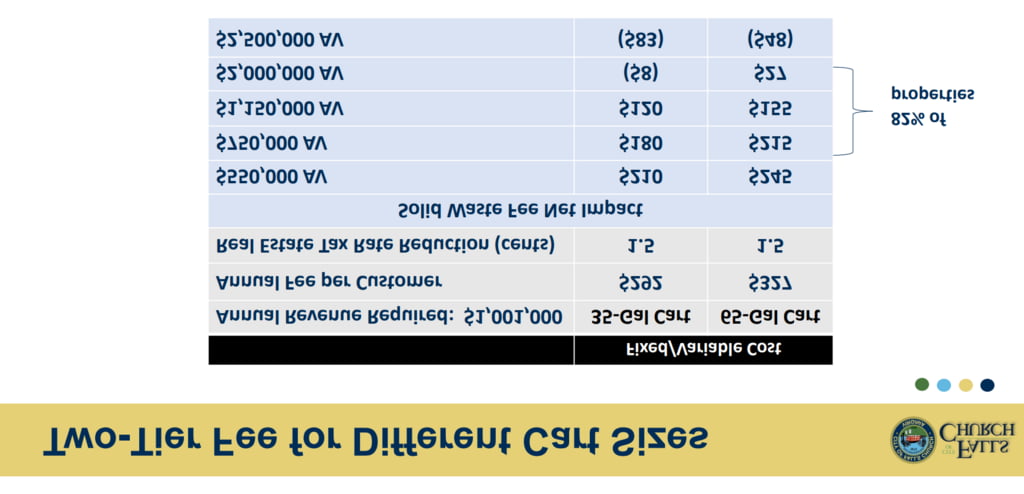
There is more to come – if we vote for this change at first reading next Monday (Aug 11) and the second reading (Sept 6), there will be a lot more communications as we get into implementation.
And being the civics nerd that I am, our summer trip this year happened to pass through cities on trash day! I snapped photos of various types and sizes of communities that all had moved to offering 3rd bins/composting and variable trash cart sizes. I also looked up their fees and much like the benchmarking staff did of the NoVA region, the proposed Falls Church fee of ~$300/year are quite competitive. And for those who worry that composting bins would be gross, I peeked into those and they were just fine, but I’ll spare you those photos.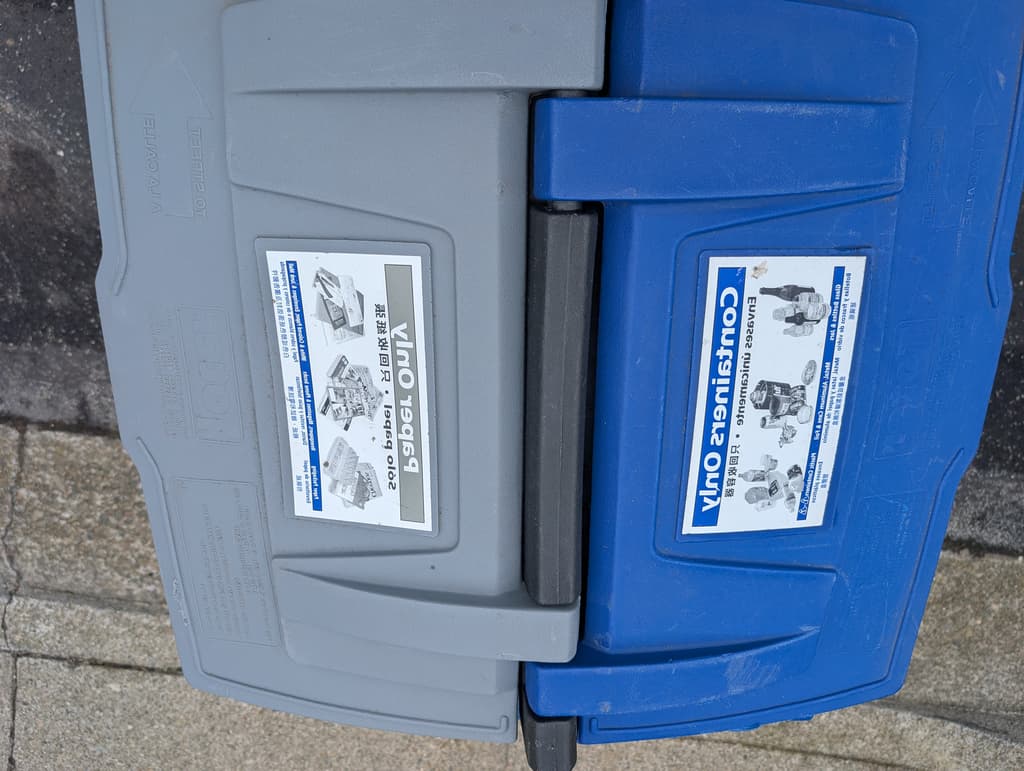
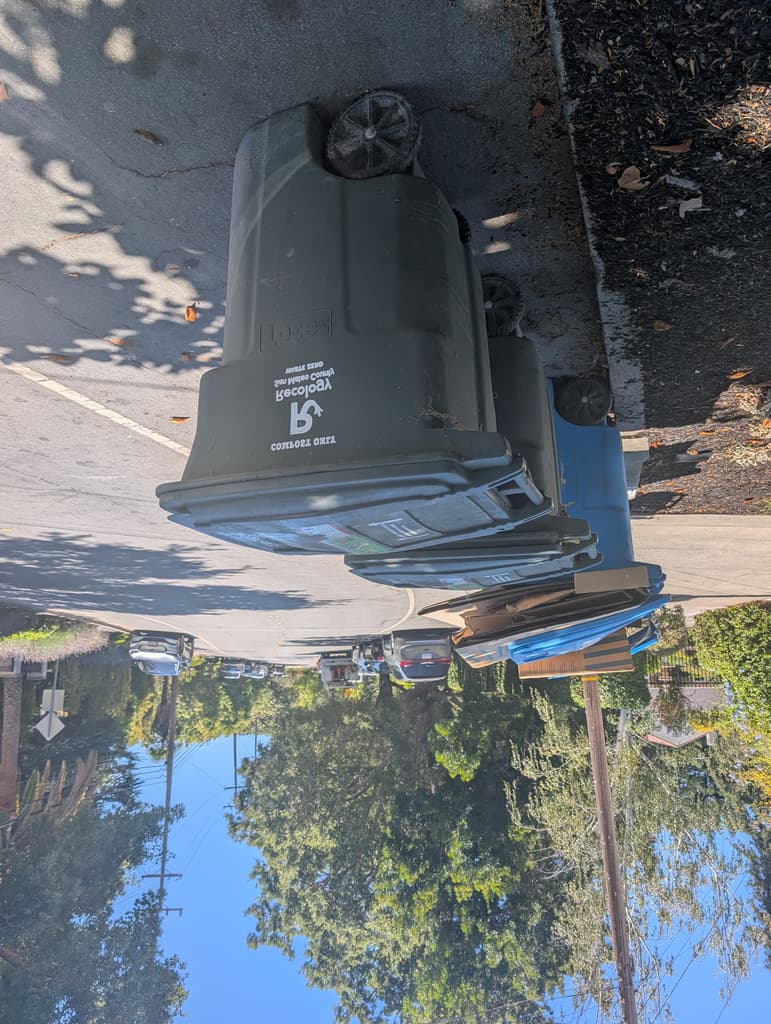
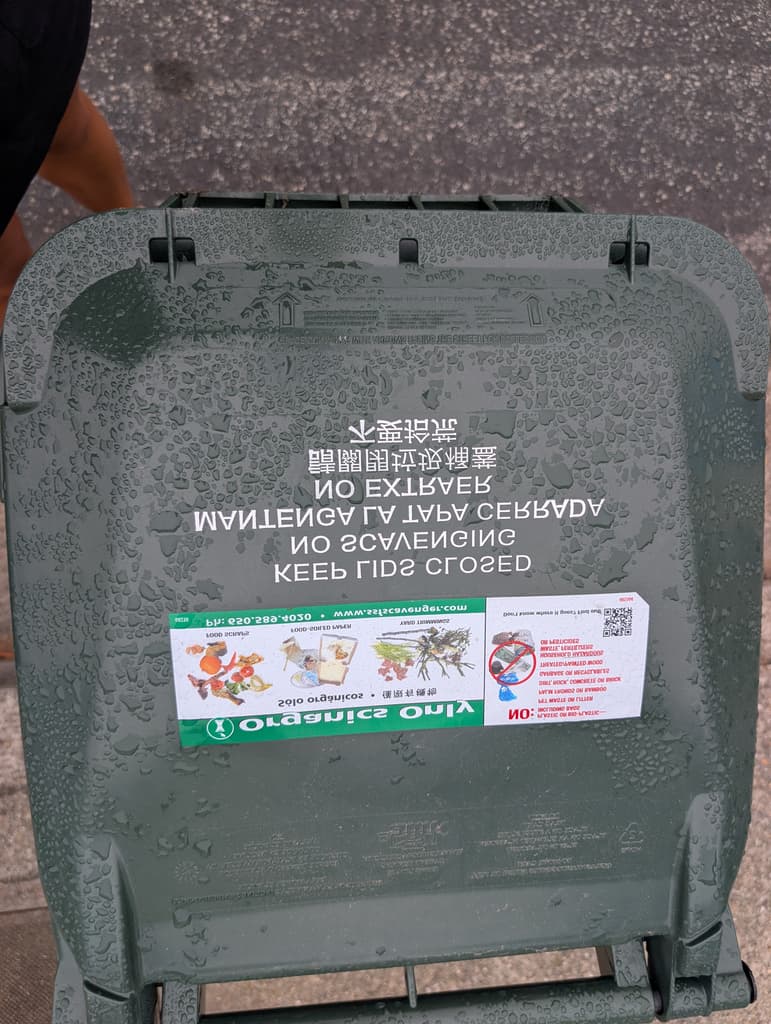
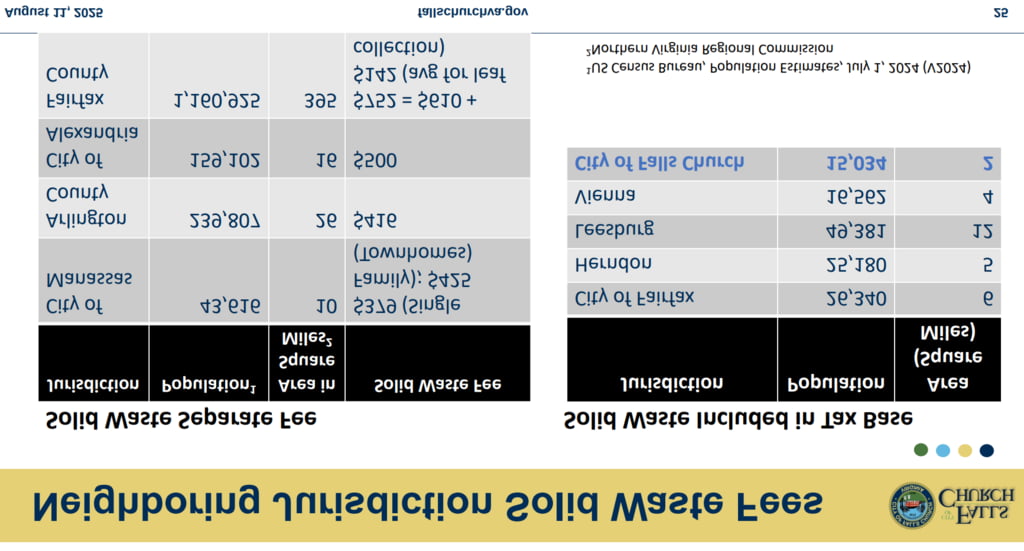
What’s Coming Up:
Monday, August 11 – City Council Meeting*
Tuesday, September 2 – City Council Work Session*
Wednesday, September 3 – Ask the Council Office Hours (9 am, City Hall)
Monday, September 8 – City Council Meeting*
Monday, September 15 – City Council Work Session*
*Mondays (except 5th Mondays and holidays) at 7:30 pm. You can access the agenda and livestream here, including recordings of past meetings